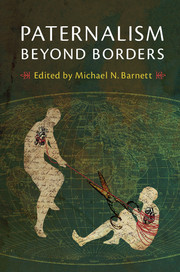Book contents
- Frontmatter
- Contents
- Notes on Contributors
- Acknowledgments
- Introduction: International Paternalism: Framing the Debate
- Part I The Boundaries of Paternalism
- Part II Paternalism, Old and New
- Part III The Social Relations of Paternalism
- 5 Paternalism and Peacebuilding: Capacity, Knowledge, and Resistance in International Intervention
- 6 Enabling or Disabling Paternalism: (In)attention to Gender and Women's Knowledge, Capacity, and Authority in Humanitarian Contexts
- 7 The Limits of Consent: Sex Traffi cking and the Problem of International Paternalism
- 8 Modernity at the Cutting Edge: Human Rights Meets FGM
- 9 Humanitarian Refusals: Palestinian Refugees and Ethnographic Perspectives on Paternalism
- Conclusion: The World According to Paternalism
- Index
6 - Enabling or Disabling Paternalism: (In)attention to Gender and Women's Knowledge, Capacity, and Authority in Humanitarian Contexts
from Part III - The Social Relations of Paternalism
Published online by Cambridge University Press: 01 December 2016
- Frontmatter
- Contents
- Notes on Contributors
- Acknowledgments
- Introduction: International Paternalism: Framing the Debate
- Part I The Boundaries of Paternalism
- Part II Paternalism, Old and New
- Part III The Social Relations of Paternalism
- 5 Paternalism and Peacebuilding: Capacity, Knowledge, and Resistance in International Intervention
- 6 Enabling or Disabling Paternalism: (In)attention to Gender and Women's Knowledge, Capacity, and Authority in Humanitarian Contexts
- 7 The Limits of Consent: Sex Traffi cking and the Problem of International Paternalism
- 8 Modernity at the Cutting Edge: Human Rights Meets FGM
- 9 Humanitarian Refusals: Palestinian Refugees and Ethnographic Perspectives on Paternalism
- Conclusion: The World According to Paternalism
- Index
Summary
In 2006, working with an international aid agency in Darfur, Sudan, I was part of a large yet very constrained humanitarian response operation. Having worked in many prior operations globally, this was somewhat different. Humanitarian operations established in response to the Darfur crisis were severely and deliberately hampered by the Sudanese government. In an attempt to thwart international attention to a situation that was increasingly being noted for extensive human rights violations, international and national organizations were subject to a very effective intimidation campaign. It was so successful that international agencies performed operations as if walking on eggshells. There was a tacit consensus among agencies that the best-case scenario was to strive to maintain the provision of basic services, even where this meant working around, and saying little publicly about, the rights violations that were occurring within and outside the camps.
I was working on what might have been considered the most sensitive issue in that context at that time – the prolific use of sexualized violence, particularly rape, against women by parties to the conflict in Darfur. Sexualized violence in wartime is generally understood as a gendered violence, primarily impacting women and working off of gendered norms of power and inequalities between men and women. The prolific use of sexualized violence by armed actors became synonymous with the Darfur conflict in the global media in ways that had not been seen since the wars in the former Yugoslavia. The image of the raped female victim also became ubiquitous with Darfur and in many ways became a cornerstone of the multiple global advocacy movements that arose to decry what was happening there.
In this highly charged political situation, the act of rape and other kinds of sexualized violence took on hyper political significance. With the eyes of the International Criminal Court on the Darfur situation at the time, and the US government also making noise about possible genocide, the act of rape, formerly prosecuted as a component of genocide in the International Criminal Tribunal for Rwanda, invoked political significance for a government that could be held culpable.
- Type
- Chapter
- Information
- Paternalism beyond Borders , pp. 185 - 223Publisher: Cambridge University PressPrint publication year: 2016
- 1
- Cited by



